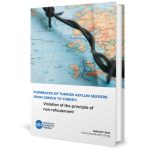Tülay Hatimoğulları, co-chair of Turkey’s pro-Kurdish Peoples’ Equality and Democracy Party (DEM Party), declared at the 13th British Alevi Festival in London that any future peace process in Turkey must include the active participation of Alevis, a historically persecuted religious minority, calling their involvement essential to building a democratic society, Turkish Minute reported on Monday.
Speaking before thousands at one of Europe’s largest Alevi cultural gatherings, Hatimoğulları said democracy and peace in Turkey are impossible without addressing Alevi concerns and emphasized that “equal citizenship” for all — including Alevis, Kurds, Sunnis and Turks — must form the foundation of the country’s renewed peace efforts.
The recent arrest of Alevi cleric Aslan Uzun further underscored these tensions.
Uzun was detained in İstanbul while filing a legal complaint accusing Syrian interim President Ahmed al-Sharaa of crimes against humanity on Syria’s Alawite community. Turkish authorities charged him with “inciting hatred and enmity,” sparking outrage among Alevi organizations.
Alevis in Turkey and Alawites in Syria are distinct religious groups despite both being Shi’a minorities. Alevis, mostly ethnic Turks and Kurds, follow a spiritual tradition influenced by Sufism and Anatolian folk beliefs. Alawites, primarily Arabs, practice a form of Twelver Shi’ism with esoteric elements and held political power in Syria under Bashar al-Assad.
Rights advocates and lawmakers from the pro-Kurdish DEM Party condemned the arrest, saying it reflects ongoing suppression of minority voices, even as sectarian violence in post-Assad Syria raises international alarm.
The festival in London, held under the slogan “We walk with love,” included traditional rituals, performances and political panel discussions and was dedicated to Alevis killed in massacres in Syria, which speakers described as genocide by Islamist militias.
Hatimoğulları’s remarks came amid a renewed peace discourse sparked by jailed Kurdistan Workers’ Party (PKK) leader Abdullah Öcalan’s recent call for a “democratic society,” which led to the PKK’s declared ceasefire and subsequent disbanding.
She criticized the Turkish government’s treatment of Alevis and other minorities, accusing the government of trying to sever Alevis from their faith by reducing Alevi religious institutions to mere cultural spaces under the Ministry of Culture.
Other prominent voices at the festival included Hüseyin Mat and Nevin Kamil Ağaoğlu, co-chairs of the European Alevi Unions Confederation (AABK), who both called for peace, condemned Turkey’s recent arrest warrant for Ağaoğlu and pledged Alevis’ commitment to non-violent resistance.
Mat vowed Alevis would play an active role in the peace process but warned they would not trust “political Islamists” or allow the process to be controlled by President Recep Tayyip Erdoğan or his far-right ally Devlet Bahçeli.
Hatimoğulları also denounced growing state repression against opposition figures in Turkey, including trustees appointed to DEM Party municipalities and legal actions against elected officials from the main opposition Republican People’s Party (CHP).
She warned that any sustainable resolution must include guarantees of cultural rights, education in one’s mother tongue and protections against gender-based violence, aligning the Alevi and Kurdish struggles with broader democratic demands.
British MP Bambos Charalambous voiced support for the Alevi community in the UK and condemned the violence in Syria, pledging to raise their concerns in parliament.
Festivalgoers protested political repression in Turkey, danced the traditional halay and semah and chanted slogans for freedom and equality, while artists like Ayfer Düzdaş and Mikail Aslan closed the event with music rooted in Alevi cultural heritage.
Hatimoğulları ended her speech invoking the rebellious spirit of 16th-century Alevi poet Pir Sultan Abdal, calling on supporters to continue resisting through unity and struggle.














